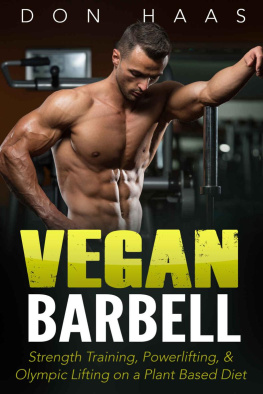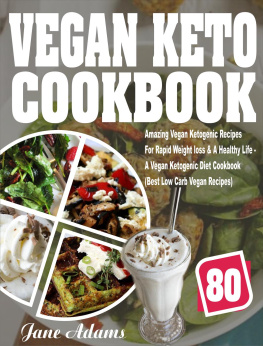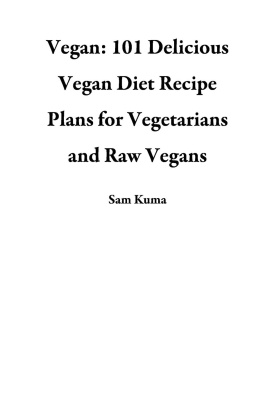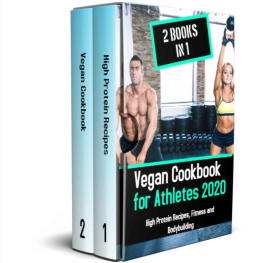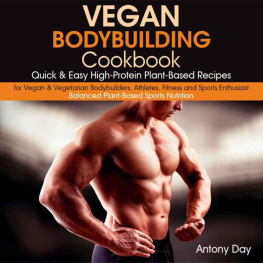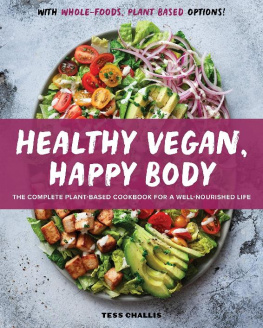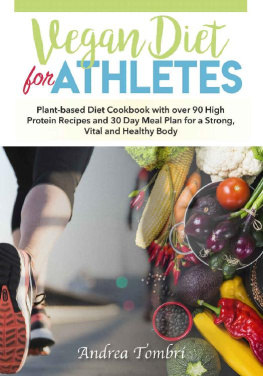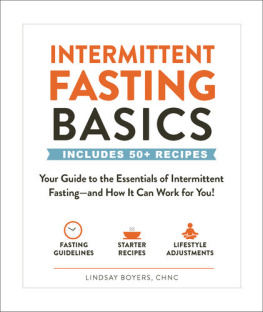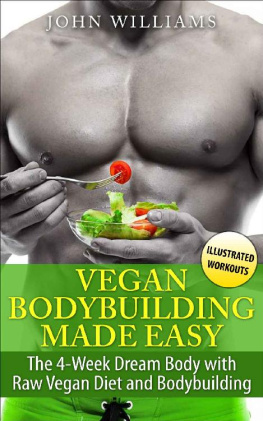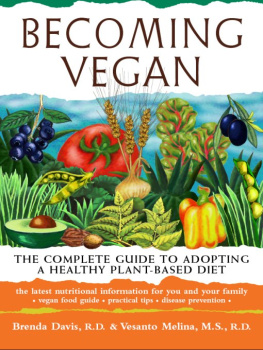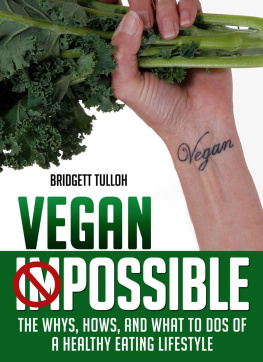Vegan Barbell
Strength Training, Power Lifting and Olympic Lifting on a Plant Based Diet
Copyright 2015 Don Haas. All Rights Reserved. No part of this book may be reproduced in part or in whole without consent of the author.
Disclaimer
The views expressed in this book are for educational purposes. This eBook is not intended to be substituted for advice by a medical physician. Information in this eBook should not be used to diagnose or treat any health problem or disease. Anyone embarking on a diet and exercise program should consult a physician for advice before doing so. The author of this eBook is not liable for the actions of the reader.
Table of Contents
An Introduction to Vegan Barbell
Chapter 1 - What is Your Goal?
Chapter 2 - Choose Your Body Type
Chapter 3 - Macronutrient Breakdown by Body Types and Goal
Chapter 4 - Training Goals within your Body Type
Chapter 5 - Shopping List Based on Goals
Chapter 6 - FAQ
Chapter 7 Food Planning and Recipes
An Introduction to Vegan Barbell
To say that veganism in general is on the rise would be an understatement. What was once a fridge diet reserved for yuppies and or hippies is now becoming part of the mainstream. However I do not think that this movement if you wish to call it, would surpass that of traditional meat based diets anytime soon. What might even be a harder sell is the strength community, that for years and even decades have advocated the need of consuming vast amounts of animal protein in the pursuit of size and gains in the weight room.
This book is not going to be an activist book or an in your face rant about the superiority of adopting a vegan diet (well maybe in some spots) but it will focus on addressing the old question of can vegans be strong or if not stronger excluding animal products? I would like to answer this in couple of sentences and in the following paragraph.
The present book would specifically address how strength athletes (that yield the barbell) can successfully transition to a plant based diet without losing their desired strength and size. You will hear me reference the barbell strength athlete. Basically I am referring those of us that get our rocks off squatting, benching, deadlifting, pressing, snatching, and cleaning with a barbell. However keep in mind that the ideas Im suggesting in this book will also pertain to bodybuilders or those with general fitness goals.
Books of this nature would be inconceivable over a decade ago. But the present upsurge in vegan lifters clearly proves the possibility and success of vegan diet. A considerable number of serious plant based athletes have also found this to be true that would answer the earlier question about success on vegan diet. Patrik Baboumian of Germany has set multiple world strongman records. Ilya Ilyin, considered the best among worldwide Olympic weightlifters has won gold medals as a vegetarian. Our own Kendrick Farris, one of the United States best Olympic Lifters also currently adopted a vegan diet.
There are several sources on technical form or programming. However there are limited information addressing how a barbell strength athlete can succeed and or transition to a vegan diet. When you read any number of fitness related plant based vegan books you might find some redundancy and expect some content be included. Most notably is the issue of protein. Unfortunately this will inevitably have to be covered as a result of a massive re-education in the public that you can survive and thrive on plant proteins
While adopting the vegan diet as a strength based athlete, it is not surprising to have several questions in mind regarding the plant-based diet. Do you often find yourself searching answers for statements like these?
Does switching to vegan diet deprive my body of high quality proteins?
Does vegan diet fail to provide the body with sufficient calories required for strengthening exercises and barbell training?
Do I need to live on unappetizing food and forget my favorite meal?
We all know that proteins are building blocks of our body. To say the least, proteins enhance muscle development. This is the reason several strengthening programs call for protein shakes and high protein supplements. Going vegan does not mean that your body is deprived of high quality protein. Plant based diet equally provides paramount protein as that of animal protein.
The best part of vegan diet is it provides all the essential nutrients, fiber and vitamins which are not found in animal based food.
Besides providing your body with the essential nutrients, transition to vegan diet is associated with numerous health advantages and is regarded as a healthy alternative to non-vegetarian diet. Apart from reducing carbon footprint, going vegan is the best way to clean eating and body detoxification. Plant based diet help to regularly flush out toxins from your body thus giving your metabolism a boost and cleaning your entire system while enhancing vigor.
Vegan diet also provides the body with sufficient calories for efficient barbell training and other strengthening exercises in the weight room. This means your body is equally capable and healthier for rigorous training as that of your non-vegetarian counterparts. When we think of veganism what first flashes through our mind is unappetizing food. But switching to vegan diet does not mean living on bland food and salads. There are several innovative methods to make vegan dishes flavorful. In fact vegan recipes if cooked using little creativity, balancing the right amount of herbs and spices, turn out to be more exciting and tastier than non-vegetarian dishes. I will be sharing such innovative vegan recipes in this book that will equally satisfy your taste buds and barbell training. Feel free to thrive on plant based diet and get confident on the work floor.
Here are top six reasons why a barbell strength athlete should switch to veganism
- Whole food: Proteins are an essential component of any strengthening exercise program. Plant based diet comes with a complete package of proteins and nutrients. They provide the body with complete nourishment essential for a successful barbell training
- Clean eating: You must have heard the benefits of clean eating. Vegan diet is considered as the healthiest way of clean eating. It doesnt get cleaner than fruits and vegetables!
- High fiber: Plant based diet is rich in fiber. It provides the body with the dietary fiber content essential for healthy weight and reducing heart related illness
- Disease prevention: Adopting plant based diet plays a key role in reducing the chances of developing several diseases such as cancer, obesity, rheumatoid arthritis and high blood sugar level.
- Essential vitamins: An apple a day keeps the doctor away. Fruits and vegetables are packed with all the essential vitamins and nutrients required to develop and nourish a healthy and strong body which cannot be provided by animal based diet
- Healthy fats: Fats sourced from animals increases the risk of high cholesterol levels and cardiac illness. Moderate levels of plant fats such as olive oil and coconut oil have been found to protect the body against health risk factors. As a barbell strength athlete it's important to include healthy sources of fat to maintain a healthy body and adequate size .
Chapter 1 - What is Your Goal?
You have heard it a million times. What is your goal? For this book I am referring specifically to what do you want to lift and at what body weight? Most will fire back I want to lift as much weight as I can. But they often fail to consider that the maximum amount you are capable of lifting depends on your weight. If this were not the case there would be no need for weight classes. I am making this seemingly obvious point only to emphasize that it will still ring true once you adopt (or transition) to a more plant based diet.
Next page
